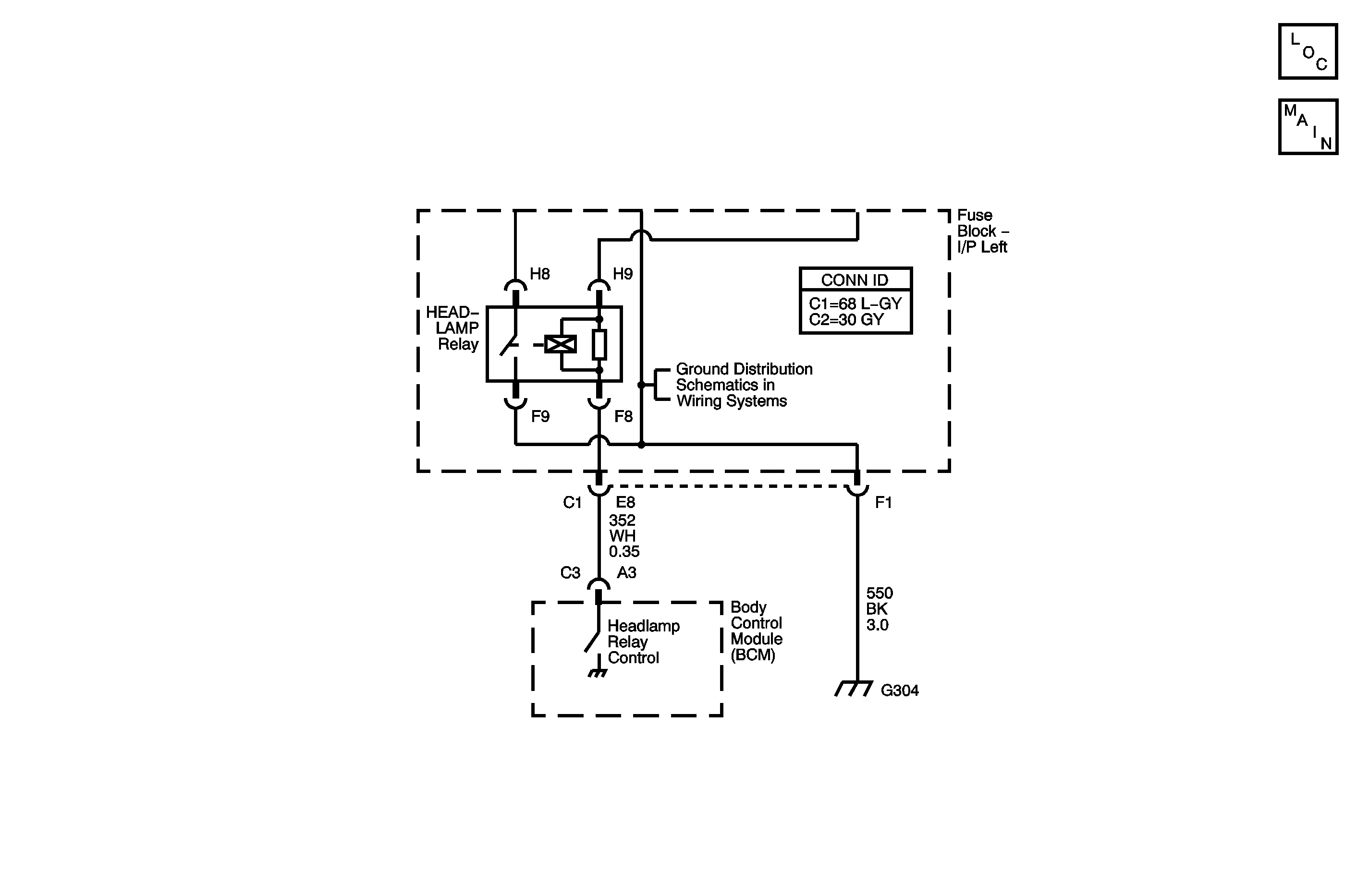
Circuit Description
The body control module (BCM) turns ON the headlamp relay when the ambient light sensor senses a dark condition. Battery positive voltage is supplied to the headlamp relay at all times through the BACKUP/TURN fuse. The BCM grounds the headlamp relay control circuit in order to activate the relay.
DTC Descriptor
This diagnostic procedure supports the following DTC:
DTC B2575 Headlamp Control Circuit
Conditions for Running the DTC
| • | The ignition switch is in the ON position. |
| • | The ambient light sensor senses a dark condition, automatic lamp control (ALC) headlamps ON. |
Conditions for Setting the DTC
The headlamp relay control circuit is open for 5 seconds.
Action Taken When the DTC Sets
The SERVICE indicator illuminates.
Conditions for Clearing the DTC
| • | The conditions for setting the DTC are no longer present. |
| • | A history DTC clears after 100 malfunction free ignition cycles. |
| • | The BCM receives the clear code command from the scan tool. |
Diagnostic Aids
| • | Turn the ignition switch to the OFF position, cover the ambient light sensor on the dash, wait for 15 seconds and then return the ignition to the ON position. The low beam headlamps should illuminate. |
| • | If the DTC is a history DTC, the problem may be intermittent. Refer to Testing for Intermittent Conditions and Poor Connections. |
Test Description
The numbers below refer to the step numbers on the diagnostic table.
-
Listen for an audible click when the headlamp relay operates. Command both the ON and OFF states. Repeat the commands, as necessary.
-
Tests for voltage at the coil side of the headlamp relay. The BACKUP/TURN fuse supplies battery positive voltage to the coil side of the headlamp relay.
-
Verifies that the BCM is providing ground to the headlamp relay.
Step | Action | Yes | No |
|---|---|---|---|
Schematic Reference: Headlights/Daytime Running Lights (DRL) Schematics | |||
1 | Did you perform the Diagnostic System Check - Vehicle? | Go to Step 2 | |
Does the headlamp relay turn ON and OFF with each command? | Go to Testing for Intermittent Conditions and Poor Connections | Go to Step 3 | |
3 |
Do the headlamps illuminate? | Go to Step 4 | Go to Step 15 |
Does the test lamp illuminate? | Go to Step 5 | Go to Step 14 | |
Does the test lamp turn ON and OFF with each command? | Go to Step 11 | Go to Step 10 | |
6 | Probe the switch side battery positive voltage circuit of the headlamp relay with a test lamp that is connected to a good ground. Does the test lamp illuminate? | Go to Step 7 | Go to Step 8 |
7 | Connect a test lamp between the switch side battery positive voltage circuit of the headlamp relay and the switch side ground circuit of the headlamp relay. Does the test lamp illuminate? | Go to Step 11 | Go to Step 16 |
8 |
Does the test lamp illuminate? | Go to Step 13 | Go to Step 15 |
9 | Test for an open or high resistance on the low beam signal circuit. Refer to Circuit Testing and Wiring Repairs. Did you find and correct the condition? | Go to Step 20 | Go to Step 12 |
10 | Test the control circuit of the headlamp relay for a high resistance or an open. Refer to Circuit Testing and Wiring Repairs. Did you find and correct the condition? | Go to Step 20 | Go to Step 12 |
11 | Inspect for poor connections at the headlamp relay. Refer to Testing for Intermittent Conditions and Poor Connections and Connector Repairs. Did you find and correct the condition? | Go to Step 20 | Go to Step 17 |
12 | Inspect for poor connections at the harness connector of the body control module. Refer to Testing for Intermittent Conditions and Poor Connections and Connector Repairs. Did you find and correct the condition? | Go to Step 20 | Go to Step 18 |
13 | Inspect for poor connections at the harness connector of the headlamp switch. Refer to Testing for Intermittent Conditions and Poor Connections and Connector Repairs. Did you find and correct the condition? | Go to Step 20 | Go to Step 19 |
14 | Repair an open or high resistance in the coil side battery positive voltage circuit of the headlamp relay. Refer to Wiring Repairs. Did you complete the repair? | Go to Step 20 | -- |
15 | Repair an open or high resistance in the low beam signal circuit. Refer to Wiring Repairs. Did you complete the repair? | Go to Step 20 | -- |
16 | Repair an open or high resistance in the ground circuit of the headlamp relay. Refer to Wiring Repairs. Did you complete the repair? | Go to Step 20 | -- |
17 | Replace the headlamp relay. Refer to Relay Replacement. Did you complete the replacement? | Go to Step 20 | -- |
18 | Replace the body control module. Refer to Control Module References for replacement, setup and programming. Did you complete the replacement? | Go to Step 20 | -- |
19 | Replace the headlamp switch. Refer to Headlamp Switch Replacement. Did you complete the replacement? | Go to Step 20 | -- |
20 |
Does the DTC reset? | Go to Step 2 | System OK |
